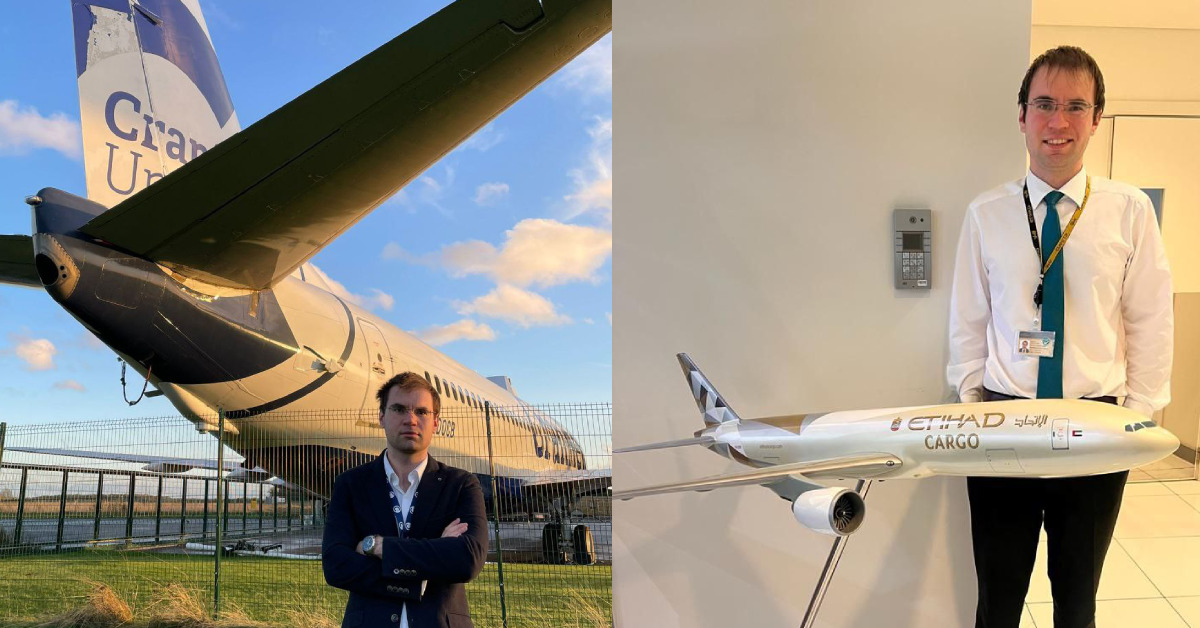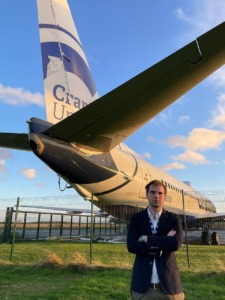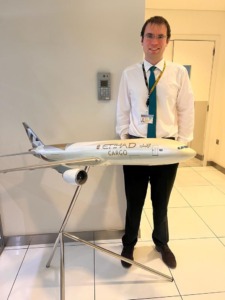Air Transport Management alumni stories: Oscar Daniel Castrillo, Cargo Charter Sales Analyst in Abu Dhabi
11/01/2023

Oscar Daniel Castrillo is a Cargo Charter Sales Analyst at Etihad Airways in Abu Dhabi. He graduated from Cranfield University with an MSc in Air Transport Management in 2022. Here, Oscar talks about how studying at Cranfield enhanced his career prospects, the benefits of the alumni network, and why pursuing a career in cargo was his best decision.
- What sparked your interest in the air transport industry?
I have been into aviation for a long time. I think the fascination with flying is enshrined in human nature, there is something unique in this industry – perhaps that we somehow realise the old human dream of being able to fly.
I am also very passionate about the business world, commercial and financial topics, as I come from a family of entrepreneurs, both from my father’s side and my mother’s. The natural outcome of the equation of being into aviation, economics, finance and business management was inevitably airline management, I guess!
That being said, Cranfield was ultimately responsible for skyrocketing my interest in airlines and aviation. The University converted me into one of those aviation geeks who know too many aircraft types, airline and airport IATA codes!
- Why did you choose Cranfield?
I was looking for a year-long, English-taught master’s degree in Airline Management, with good employability prospects, strong links with industry, industry lectures, great teaching, high-quality air transport research and an inspiring aerospace environment (I mean, you have an airport right there where you study!) and Cranfield offered all of this.

- How did you find the course? What were the highlights?
The course was one of the best decisions and years of my life. Cranfield lived up to my expectations, which were very high to begin with. The highlights for me were the Group Project, in which we set up an airline from scratch and presented it to a panel of industry professionals and academics, and the lectures from industry guests. The course gave me the opportunity to push myself out of my comfort zone and learn directly from the industry. These are definitely some of my most cherished memories.
Also, the research assignments and the thesis sharpened my airline knowledge and research skills very much. I mean, by the end of Cranfield, I had read hundreds and hundreds of papers and book chapters on all sides of airline management: fleet planning, airline finance, airline strategy… I enjoyed it a lot.
- What has your career path been since graduating?
Before even completing my MSc from Cranfield, I was lucky enough to get multiple job offers, both from the commercial and the engineering side (I am an engineer) and for different countries and company types. In the end, I decided to accept the offer from Etihad Airways, the national carrier of the United Arab Emirates, to join the airline as a Cargo Charter Sales Analyst, a role based in Abu Dhabi, Etihad’s hub.
I have to say that I could not be happier in Etihad and Abu Dhabi. Etihad is one of the best airlines in the world, it offers high-quality products and is highly respected. My impression is that it is an airline that cares much about its employees. I am learning a lot, the atmosphere in the office is extremely nice too, and my colleagues are super helpful and kind! I honestly feel so privileged and still struggle a bit to believe that all that has happened in the last year is real.

- How did Cranfield help you get your current job?
Cranfield University has an outstanding international reputation in the aviation industry and offers specialised airline education that makes you all set for prospective job hunting. This certainly helped me stand out among many other candidates. I would not be here without Cranfield. The University also enjoys a good relationship with different airlines, with Etihad being one of them. Actually, Etihad was the first aviation company to join the Digital Aviation Research and Technology Centre (DARTeC), which is already fully set up and open at Cranfield. I believe you can see Etihad’s logo on the main screen inside the building as one of the sponsors of the project if my memory serves me well.
Furthermore, the Cranfield alumni network is unique and unrivalled in aviation. There are around five Cranfield ATM alumni in my department (Etihad Cargo) and the Cranfield presence extends to the senior management team. My colleagues have been an extremely valuable resource to get up to speed with the job and settle down well in Abu Dhabi. Without their help, I would have been more lost when it comes to settling down in the UAE.
- What does a typical week look like for you in your job?
I am not sure if the concept of a ‘typical week’ applies to airlines. However, I will summarize my responsibilities. Within Etihad Cargo, I work in the Charter Sales team. As you may know, in air transport there are scheduled (published) flights and charter flights. Instead of being part of the regular schedule of an airline, charter flights are arranged for a specific itinerary, purpose or customer. In cargo, typically freight forwarders or charter brokers hire airlines to transport cargo by air from A to B.
My team has a pretty wide range of duties, as we are the ones who oversee the whole process for charter flights and take care of all sales aspects from the beginning to the end. One of the key roles of my team is relationship management with internal and external stakeholders. A flight setup from the beginning is a highly complex task that involves several internal and external stakeholders (freight forwarders, the legal department, the finance department, the scheduling and network planning teams, operations, documentation and export control, pricing, regional managers, ground handling, loadmasters, managers of specific products that may need specific conditions such as temperature controls…). We are the ones who have an aerial view of the process, keep track of everything and ensure that the process moves forward smoothly and seamlessly.
For instance:
- We quote charter flights to our customers once we receive their inquiries (price quotations).
- We estimate the costs of the charter flights.
- We often have meetings with the customers to discuss charter flights or contracts.
- We are the point of contact for our customers, the coordination point and nexus of information between all our internal stakeholders and them. We are the ones who engage with them and keep them posted throughout the charter flight process.
- We book the charter flights in our booking systems.
- We issue the contracts and have them signed by our company and the customer, coordinating the raising of the invoices with the finance team and the registration of the contracts in our systems in due time.
- We do data recording and data-tracking tasks, ensuring that our internal databases and systems are completely up-to-date data-wise and that all required data has been captured into the systems.
There are more things, though!
- What advice do you have for future students?
Don’t run away from cargo at first! If you wish to work for an airline, you may have faced a dilemma between beginning your career in pax (passengers) or on the cargo side. I understand, moving people may seem more attractive than moving ‘things’. I am aware that perhaps most Cranfield students are more into pax than cargo or they may just not know that much about cargo when beginning the MSc in Air Transport Management. This was actually my case; I was naturally much more interested in pax when I commenced the MSc.
However, I now realise that cargo may be more exciting, interesting and challenging than pax. Every day is different in cargo and many things occur that would not in pax. It may be the craziest part of the airline industry! Also, air cargo is the fastest and most secure shipment transport mode and one of the main enablers of economic growth and international trade (around 35% of global trade by value is shipped via air cargo). Cargo has been growing over the years and will probably continue to do so in the long term, in line with economic growth and other trends like the e-commerce boom. You may never know if your future job offer comes up from the cargo industry, so I would suggest researching and knowing the basics of air cargo and being open-minded job-wise. Also, bear in mind that it is not a lifetime decision, since you can work in pax and then switch to cargo and the other way around. There are many replicable skills with one another and in many airlines options to internally switch exist.
Your employability may soar if you are flexible enough to relocate geographically and be open to different airline jobs and departments. Please, don’t let job rejections bring you down. Be patient and constant – I also went through rejections and suddenly I had to choose between different awesome opportunities.
Also, please take advantage of the Cranfield network. If you are interested in working for a specific company or in a particular country, search for Cranfield alumni living or working there and ask them straight away. Don’t only research on the internet or judge in advance!
Categories & Tags:
Leave a comment on this post:
You might also like…
From classroom to cockpit: What’s next after Cranfield
The Air Transport Management MSc isn’t just about learning theory — it’s about preparing for a career in the aviation industry. Adit shares his dream job, insights from classmates, and advice for prospective students. ...
Setting up a shared group folder in a reference manager
Many of our students are now busy working on their group projects. One easy way to share references amongst a group is to set up group folders in a reference manager like Mendeley or Zotero. ...
Company codes – CUSIP, SEDOL, ISIN…. What do they mean and how can you use them in our Library resources?
As you use our many finance resources, you will probably notice unique company identifiers which may be codes or symbols. It is worth spending some time getting to know what these are and which resources ...
Supporting careers in defence through specialist education
As a materials engineer by background, I have always been drawn to fields where technical expertise directly shapes real‑world outcomes. Few sectors exemplify this better than defence. Engineering careers in defence sit at the ...
What being a woman in STEM means to me
STEM is both a way of thinking and a practical toolkit. It sharpens reasoning and equips us to turn ideas into solutions with measurable impact. For me, STEM has never been only about acquiring ...
A woman’s experience in environmental science within defence
When I stepped into the gates of the Defence Academy it was the 30th September 2019. I did not know at the time that this would be the beginning of a long journey as ...






